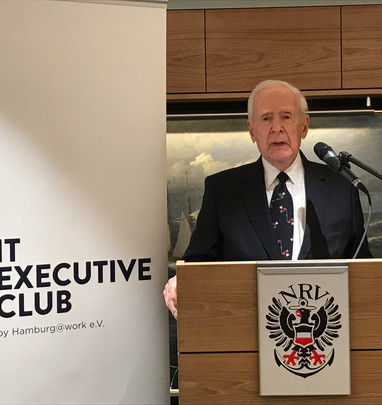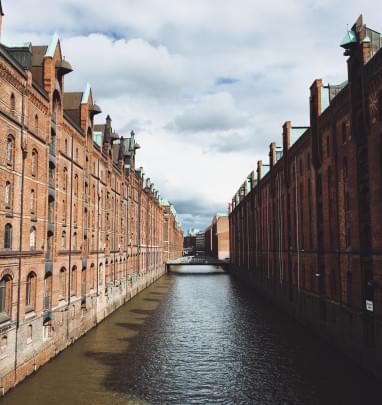Digitalization is the biggest upheaval humanity has ever experienced. Nothing will remain how it was. Whether in the world of business or in private life. Everything is changing. Changing, because comprehensive information available concurrently, worldwide, and the worldwide dialogue that it enables mean a complete change in relationships for people, and politics, and business, and science. There is no getting away from it. It’s like any technical progress. It makes little sense to try and resist digitalization, in the same way that some tried to resist the railways or the telephone or radio and television.
Klaus von Dohnanyi interviewed by HANSEVALLEY Editor-in-Chief Thomas Keup.
“In a digitally connected world, all companies are neighbors,” you declared at the New Year Reception of the “IT Executive Club” at the Norddeutscher Regatta Club on 12 January. You talk of a change in communication that is bringing about societal change. What do you mean by that?
A profound change in communication is happening. People used to talk to each other by looking each other in the eye. You can now correspond simultaneously with a Chinese business partner or a friend in Tokyo not simply by talking to each other, you can also see each other on Skype. You can bridge the distances across which people have coexisted. That is changing human relationships, changing businesses, and also changing the world of politics. Digitalization is the biggest upheaval humanity has ever experienced.
Olaf Scholz was indefatigable in warning clearly that digitalization will take hold of every area of our society and that we can’t afford to wait and see what happens. Based on your wealth of experience, how do you perceive the development in digitalization, which aspects fascinate you and which aspects give you personally cause to be fearful?
”We are lacking the infrastructure for speed”
It has become a vital element of competition. You simply can’t get away from it for no other reason than you would otherwise lose touch with competition worldwide. That is what has been preoccupying Olaf Scholz and everyone else who has been looking into the topic. Germany is in one respect in a good position, for instance in implementing Industry 4.0. On the other hand we are still lacking the requisite technical infrastructure to enable the necessary communication speeds over the digital network.
“The really good people often don’t have any formal training”
Another reason why we don’t cope so well with that is because we have a hierarchical system where politics, for example, decides on promotion according to specific principles based on training formalities. The really good people in the digital trade often have an entirely different training background or maybe no training at all – yet they are still among the best people. The German state obviously can’t keep up with that, whether in rating capability or in determining suitable remuneration that can compete with industry.
“Don’t let children loose on the Internet too early”
I am concerned that such a total structural change in communication is having side-effects that cannot be ignored. Some educators warn you shouldn’t let your children loose on the Internet too early. They claim this might prevent them from developing the capacity for empathy and social interactions properly. Then there’s the problem of data protection. There is nothing in this world that doesn’t have negative consequences and cause problems as well as bringing benefits. So we need to address them.
“T he perception of autonomy saves us from commoditization by the digitalized world ”
Political involvement takes place within the narrow system limits of parties and careers. Our civil society above all seeks to make our city a place worth living in. What impetus and initiatives will it take to ensure we don’t just have client groups involved in the political decision-making of parliaments at a time of digital uncertainty?
Discussions within people’s parties takes place within a relatively closed circle that has relatively fixed beliefs – and they are often conducted based on a fairly narrow horizon of information. Obviously politics is changing completely. We are currently seeing how the U.S. President no longer takes any of politics’ classic information resources seriously, let alone uses them. He isn’t interested in interviews with leading newspapers that have a circulation of half a million, he uses Twitter and reaches almost 50 million followers.
“Many an old building won’t withstand the storm”
That is changing politics, and also changing the opportunities in politics. I believe we’re going to see a far-reaching shift in the landscape of political parties, maybe in democracy too, and that we’ll have to put more effort into it than we have been doing. To safeguard the stability of democracy in the face of these new changes – and also to restructure democracy. Quite a few of our worthy old buildings will not withstand the storm of the new digital world.
There are various societal means of addressing the status quo of uncertainty or dissatisfaction: for instance by adapting, bailing out or rebelling. What course do you recommend to people who won’t settle for a world that they see changing dramatically and want to influence change?
My first suggestion is that everyone needs to know what they need and want for themselves, and they need to learn that. And if the world changes, they need to learn how they can be comfortable in the world as it is. That world will be a different one, a digitally defined world. For my part, I will keep reading and am not prepared to settle just for the headlines that appear in an iPhone’s apps.
“The perception of autonomy is our salvation”
I will not do that, I try to be informed in depth. Others may see that differently, but that depends on how they see themselves. My advice to all is to look at yourself and consider what you are capable of, what you want, what you want to do, what you need to learn to achieve that – in other words, the perception of autonomy saves us from commoditization by the digitalized world.
The metropolitan region is a traditional production location with shipbuilding, aircraft building, and plant and mechanical engineering. Industry 4.0 affords fresh opportunities to develop globally successful products using digitally connected production and supply processes. Do you believe that will suffice, or is Europe’s industry going to be pulverized between the United States and China?
That very much depends on how we treat it. Europe’s diversity – that nobody should seek to level, nor apply a one-size-fits-all policy from Brussels – has meant that the past few centuries have been European centuries. Europe has a big opportunity if we reflect on what we can achieve by pulling together for the things that are done on a large scale, such as Airbus. And if we unleash our capabilities simultaneously in Hamburg, Lübeck, Osnabrück, Frankfurt and Stuttgart, on the back of sound municipal policies. That mustn’t be disrupted by a European policy of leveling.
The digital offerings of Amazon, Apple, Facebook and Google already contain artificial intelligence that recognizes commands and translates into different languages. What opportunities and challenges do you see in the use of artificial intelligence – particularly for Hamburg, with tens of thousands of jobs here dependent on international services?
Artificial intelligence is a next step, and it will be as futile to try and hold it back as it was to resist the first computers. It is all about encouraging Europe’s very diversity. But to achieve that we need decisive decentralization in Europe. We need strong mayors, strong municipalities, and strong decentralized economic policies. The creativity of our state and Europe’s creativity stems from diversity, not unity.
Our central apprenticeship system with apprentice, journeyman and master craftsman goes right back to the 13th century. We have universities that have been developing successfully since the 19th century. How can a linear educational system be opened up to a flexible and individual world of work of the 21st century and be developed successfully?
We have an educational system that has proved hugely successful. Germany’s success over the past century would have been inconceivable without a successful educational system. Obviously a lot is now changing. I think you need to make sure, of course, that digital instruments are also used in schools. But I wouldn’t do that too early on. I think children use smartphones enough at the age of three, so you don’t need to teach them that at elementary school.
Digitalization and transformation could do away with between 10 and 20 million jobs in Germany over the coming years. The challenge will be to offer an unconditional basic income as an opportunity for new, meaningful value creation. What do you think of the model that has been proposed by DM founder Götz Werner?
I am initially very skeptical. I think people do need an incentive to work. If you effectively offer them pay instead of work that they then no longer need, it isn’t going to promote either social cohesion or greater equality. But it is a multi-faceted concept that very many intelligent people are advocating, and I think it will continue to be debated and maybe one day become unavoidable.
“Steer in the direction in which you will find a good profession”
In fact I do not share your argument about the 10 or 20 million jobs. What matters now is promoting the jobs that might be viable by providing suitable training. I don’t think it’s a great idea to have so many people at university taking Cultural Studies rather than Information Technology. You really should try to steer people more in the direction in which they will ultimately find a decent profession.
“In the long run, Hamburg will not survive without focusing on being a science hub”
Hamburg is shaped by traditional sectors such as the maritime economy, transport logistics, and wholesale, export and retail trade. Banking, insurance and media services have undergone radical change in recent years. How well equipped is Hamburg to handle future challenges?
“Hamburg’s future is on land, not on the water”
I believe we have some very big gaps that will, however, be very difficult to fill. There is a trend that Hamburg will find difficult to resist, because the media for instance always focuses on capital cities. The second problem is of course the question of the industries you described. In my view, Hamburg is making a mistake by still underestimating the importance of Hamburg as a science hub.
“Hamburg will not survive unless it becomes a science hub”
In my first speech at the Übersee Club in 1983, I said: ‘Hamburg’s future is on land, not on the water.’ I stand by that belief. In the long run, Hamburg will not survive without focusing on being a science hub, especially now that the Chinese are expanding their Silk Road via rail and to some extent diverting their shipping to Southern Europe. We are not yet well placed to respond.
“In my opinion it is still not enough”
One consequence is of course that we are not the top choice for start-ups – Munich and Berlin are. Another result is that we are overshadowed by Frankfurt in other key areas, such as banking, because that is the city that has evolved into a banking center. We need to use science to move forward, and Mayor Scholz is now trying to help with that thrust, but I believe it is still not enough.
Our city’s success has hitherto largely been based on a worldwide reputation for reliability – going back generations. In an age of digitally accelerated change and globally led competition, do traditional Hamburg and Hanseatic values suffice – and what values do you recommend Hamburg should espouse for the future?
Those values are sufficient, but they are currently being hollowed out by the digital media. In other words, you are doing different forms of business with people you don’t know and you don’t need to look in the eye. The “honorable merchant” in Hamburg, with whom you didn’t even need to shake hands over a deal and merely needed to exchange glances, will not survive because of the large distances over which business is being done and the growing anonymity of deals.
It is not a question of needing new values. The big question is how, in a digital world, we will uphold the values that have served Germany so well. That is where I am skeptical.
Hamburg@work will present itself as a horizontal digital cluster – with a focus on the digitally connected city, Hamburg the smart city. What smart concepts and models are you familiar with and/or would like to see the Free and Hanseatic City adopt?
I get the impression the city has made huge progress in that respect, is well equipped and is also ready to open itself up to the future and to the changes that will happen. Those are actually merely the tools. The topics that need to be addressed, the question of science, the way the city will need to develop, are another matter. We are doing well in the general social sector, but I think we have a lot of ground to make up in the science sector.


